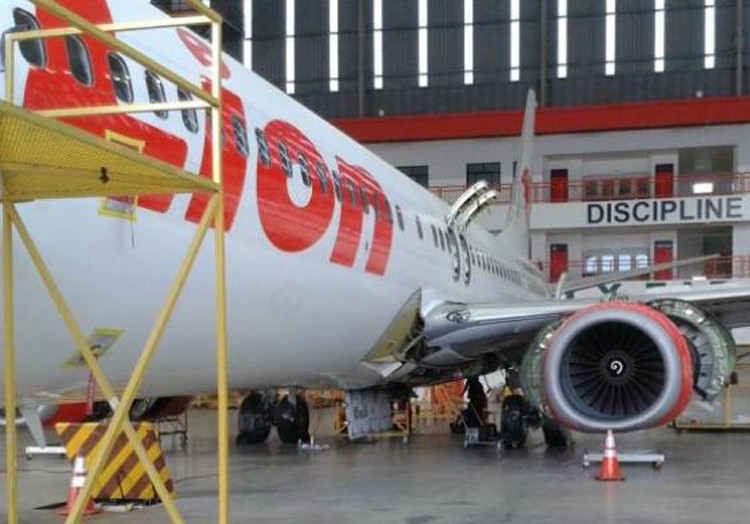Cruising amidst constant turbulence
One question remains. With a sketchy safety record and notoriously poor service, how does Lion Air keep growing their fleet, expanding their routes and continuing to have solid business, bottom line?
Change Size
 A Lion Air plane is maintenance at a workshop in Batam, Riau Island. Thousands of the airline passengers were left stranded in several airports in the country on Tuesday morning after pilots of the country's largest low-cost carrier, Lion Air, went on strike, a pilot says. (kompas.com/-)
A Lion Air plane is maintenance at a workshop in Batam, Riau Island. Thousands of the airline passengers were left stranded in several airports in the country on Tuesday morning after pilots of the country's largest low-cost carrier, Lion Air, went on strike, a pilot says. (kompas.com/-)
L
ion Air once again made national headlines. What was seemingly a minor miscommunication incident among ground staff has now blossomed into a matter of national security. A bus driver mistook the flight JT-161, originating from Singapore, for a flight from Padang. Four passengers were able to bypass immigration as a result. In the midst of the threat and fear created by the Islamic State (IS) movement’s rampant terror network, this blunder could not come at a worse time.
Since its inception, Lion Air have amassed a chock-full of other minor and major incidents. In 2013, Lion Air flight JT-908 flying from Bandung in West Java, crashed with all on-board fortunately surviving near Ngurah Rai Airport in Bali. Off the sky, Lion Air isn't doing much better either. A major strike among pilots over late accommodation payments in 2015 was a disaster for all parties involved, including passengers.
Lion Air’s biggest problem, however, are flight delays, a problem also shared by other airlines. Nonetheless, according to Bisnis Indonesia daily, Lion Air’s punctuality rate stands at 71.45 percent in 2015, 16 percent worse than Indonesia’s flag carrier, Garuda Indonesia.
One question remains. With a sketchy safety record and notoriously poor service, how does Lion Air keep growing their fleet, expanding their routes and continuing to have solid business, bottom line?
Airline industry is an extremely price-elastic industry as all airlines offer the same service of getting passengers from point A to point B by means of air travel. With that in mind, Lion Air’s founder Rusdi Kirana saw enormous potential in aggressive no-frills low-cost pricing along with his disruptive routes growth approach.
Lion Air combative growth and low-cost strategy proved to be a tremendous success in creating leverage over passengers. It creates a situation where passengers develop a need for Lion Air service regardless of its quality and reputation.
People need them whether it is for their affordable fares or their broad coverage of the archipelago. They make people fly and people are grateful for it.
In 2011, Lion Air signed a record $22 billion order for 230 Boeing aircraft. This deal signifies Lion Air's commitment to its strategy that operates a whopping 597 flights a day. And thus far, this commitment is justified. Lion Air is dominating the domestic market with approximately 35 percent of market share.
It is also worth noting that Lion Air is running a profitable operation, while many other airlines are struggling.
This scenario bears a striking resemblance to the US' airline scene. Spirit Airlines is well-known for their poor service, accruing almost three times the complaints of the industry average. Similar to Lion Air, poor service does not necessarily lead to poor business performance. Spirit Airlines is currently one of the most profitable airlines in the US with an operating margin that exceeds 20 percent. Another profitable airline is Allegiant Airlines, which is the second most hated airline in the US.
It is important to avoid the faulty causality fallacy: poor service does not equal higher profitability. Spirit, Allegiant, and Lion Air’s success comes from their disruptive business model and ruthless efficiency, not their inferior service.
Spirit introduced their revolutionary pricing scheme called “Bare Fare”, which means you only pay for your seat and gas. Under this system you don't get a free 20 kilograms for baggage check-in, you don't get to choose seats, no snacks, and you get charged for printing your ticket at the airport. They also make it their mission to fully utilize their fleet as demonstrated by their high seat density (Spirit allows for 20 percent more capacity than the average of competitors) and high daily fleet utilization (Spirit's average daily utilization is 12.7 hours vs the 8 to 10-hour average).
Lion Air is a low-cost airline. Its sole objective is to provide cheap flight and make people fly. Lion Air's high seat density, no free snacks policy, and decision to operate mostly 737s are part of the most common game plan undertaken by low-cost carriers. It might not attract love and praise but it flies people, cheaply.
Looking at cost per available seat mile/kilometer (CASM/CASK) is important to determine the efficiency of an airline. Lion Air's CASK is not publicly known as it is a privately owned company. However according to Rusdi Kirana, Batik Air currently has around 4 cents per available seat kilometer and Lion Air's number should not be far off that. Making people happy by providing better service costs money. There is a reason why Garuda’s CASK, 6.59 cents, is almost twice that of Lion's, assuming a CASK of 3 to 4 cents. This ruthless efficiency is what persuades average people to fly without thinking twice.
It is amusing that people passionately bash Lion Air's poor service yet actively prefer Lion Air because, more often than not, they are the cheaper option. Occasionally you and I want to opt for airlines with better service. But most of the times it just makes sense to go with the cheapest option, or worse, the only option!
Therein lies the power behind Lion Air. It is the most sensible option for us, passengers, regardless of its sketchy safety record and supposedly poor service. Should Lion Air manage to mend its safety problems and improve its on-time performance, the flight that Lion is currently now on should be able to continue cruising despite turbulence.
***
The writer is a master of science in finance candidate at Cass Business School, London. He holds a bachelor degree in economics from Gadjah Mada University.
---------------
We are looking for information, opinions, and in-depth analysis from experts or scholars in a variety of fields. We choose articles based on facts or opinions about general news, as well as quality analysis and commentary about Indonesia or international events. Send your piece to community@jakpost.com.









